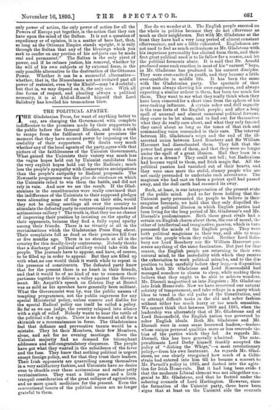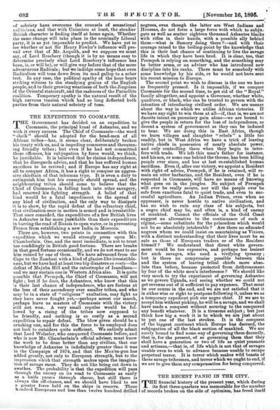THE POLITICAL APATHY. T HE Gladstonian Press, for want of anything
better to say, are charging the Government with complete indifference to the promises made by their supporters to the public before the General Election, and with a wish to escape from the fulfilment of those promises the moment that they have secured power by imposing on the credulity of their supporters. We doubt very much whether any of the local agents of the party,agree with that picture of the faithlessness of the Unionist Government. What gained the Unionists their victory was much less the vague hopes held out by Unionist candidates than the very explicit hopes held out by the Radicals ; much less the people's sympathy with Conservative anticipations than the people's antipathy to Radical proposals. The Newcastle programme was the piece de risistance on which the Unionists relied to win them the battle, and did not rely in vain. And now we see the result. If the Glad. stonians in the constituencies were really convinced that the indifference of the Unionists to their supposed pledges were alienating some of the voters on their side, would they not be calling meetings all over the country to stimulate the defeated party to controversial reproaches and acrimonious raillery ? The truth is, that they see no chance of improving their position by insisting on the apathy of their opponents, because they find a fully equal apathy among their friends. There is no vivacity at all in the recriminations which the Gladstonian Press fling about.
Their complaints fall as dead as their promises fell four or five months ago. There is no stomach at all in the country for this deadly-lively controversy. Nobody thinks that a discharge of political artillery would take with the people. The journals have to appear, and have, of course, to be filled up in order to appear. But they are filled up with what,no one would think it worth while to repeat in the presence of constituents. The defeated party know that for the present there is no heart in their friends, and that it would be of no kind of use to summon their partisans together to deliver a volley against the Govern- ment. Mr. Asquith's speech on Colston Day at Bristol was as mild as his speeches have generally been militant. What the Government won by, was the public nausea of tempting programmes, not the public eagerness for any special Ministerial policy, unless reserve and dislike for the special Radical policy can itself be called a policy. So far as we can judge, the country relapsed into silence with a sigh of relief. Nobody wants to hear the rattle of the political rifles again. There is no demand at all for a skirmish or a reconnaissance in force. The Gladstonians feel that defiance and provocative taunts would be a mistake. They let their Members, their few Members, alone, and ask for no evening meetings. Even the Unionist majority find no demand for triumphant addresses and self-congratulatory eloquence. The people have got what they wanted in the subsidence of the fever and the fuss. They know that nothing political is urgent except foreign policy, and for that they trust their leaders. Their Irish opponents are quarrelling among themselves in a very satisfactory fashion, and Unionists have no desire even to chuckle over these acrimonious and rather petty recriminations. They want a little peace and a little tranquil consideration of the great collapse of agriculture, and no more quack medicines for the present. Even the conventional taunts of the political recess are no longer grateful to them. Nor do we wonder at it. The English people succeed on the whole in politics because they do not effervesce as much as their neighbours. But with Mr. Gladstone at the front they have had a very long period of almost constant effervescence, and are a little exhausted. Englishmen are not used to feel as much enthusiasm as Mr. Gladstone witla his imperious personality has elicited from them, and their first great political need is to lie fallow for a season, and let. the political ferments abate. It is said that Dr. Arnold produced some such reaction in most of his " earnest " boys, as Mr. Gladstone has produced in his earnest disciples. They were over-excited in youth, and they became a little over-apathetic in middle life. It has been the same with the Gladstonian party. The spectacle of that great man always showing his over-eagerness, and always expecting a similar ardour in them, has been too much for. them. They want to see what they really think when they have been removed for a short time from the sphere of his- over-tasking influence. A certain sober and dull sagacity is the true forte of the English people ; and after a long spell of unusual and almost unnatural political fervour, they crave to be let alone, and to find out for themselves- what they do really care about, and what they only fancied they cared about so long as the tones of that rich and commanding voice resounded in their ears. The interval between Mr. Gladstone's reign and the end of the ill- assorted union between Lord Rosebery and Sir William Harcourt had disenchanted them. They felt that the power had gone out of them, and that they were no longer under the spell of a great illusion. Had they been in a dwam or a dream ? They could not tell ; but Radicalism had become vapid to them, and Irish magic fiat. All the political passion had vanished out of their hearts, and they were once more the stolid, clumsy people who are- not easily persuaded to undertake rash adventures. The magician who had cast on them a potent spell had passed away, and the dull earth had resumed its sway.
Such, at least, is our interpretation of the present state of the public mind. And so far from holding that the Unionist party persuaded the people to believe in their sanguine forecasts, we hold that they only dispelled the dream of political illusion in which English parties had been living for the long period of Mr. Gladstone's and Mr. Disraeli's predominance. Both these great rivals had a certain un-English charm about them, the one of moral, the other of intellectual and imaginative, passion, which in turn possessed the minds of the English people. They were both political magicians in their way, and able to mag- netise the people whom they ruled. Neither Lord Salis- bury nor Lord Rosebery nor Sir William Harcourt pos- sesses anything of the same fascination. But just for that. reason, the English people are returning to their own- natural mind, to the incredulity with which they receive the exhortation to work political miracles, and to the dis- position to look carefully before they leap,—a disposition which both Mr Gladstone and Lord Beaconsfield had managed somehow to charm to sleep, while making them believe that they ought to be able to achieve wonders. Mr. Disraeli magnetised us into Jingoism ; Mr. Gladstone into Irish Home-rule. Now we have recovered our natural sobriety of temperament, and take refuge in a party which likes to tread in the old paths of the Constitution, and. to attempt difficult tasks in the old and sober fashion. without either too much hurry or too much sensation.. We cannot think that between 1868 and 1885, when the leadership was alternately that of Mr. Gladstone and of Lord Beaconsfield, the English nation was governed by sober English ideals. Both Mr. Gladstone and Mr. Disraeli were in some sense borrowed leaders,—leaders whose unique personal qualities more or less overrode the bias of the parties which they led. As regards Mr. Disraeli, this has been generally admitted. The ante-. penultimate Lord Derby himself frankly accepted the policy of "dishing the Whigs,"—a most revolutionary policy,—from his own lieutenant. As regards Mr. Glad- stone, no one clearly recognised how much of a Celtic strain had entered into him till he became a convert to Mr. Parnell's policy in 1885, and dashed into the agita- tion for Irish Home-rule. But it had long been evide, t that the moderate Liberal element was not altogether con- genial to Mr. Gladstone, and that he fretted under the sobering counsels of Lord Hartington. However, since the formation of the Unionist party, there have been signs that at least on the Unionist side the counsels of sobriety have overcome the counsels of sensational politicians, and that with Unionism at least, the steadier British character is finding itself at home again. Whether the same change will take place in the nominally Liberal party, it is as yet impossible to predict. We have yet to see whether or not Sir Henry Fowler's influence will pre- vail over that of Mr. Asquith, and we suppose we must say, of Lord Rosebery (though it is by no means easy to determine precisely what Lord Rosebery's influence has been, is, or will be), or will give way before that of the more adventurous Radicals ; but we indulge some hope that even Radicalism will tone down from its mad gallop to a sober trot. In any case, the political apathy of the hour bears striking witness to the steadying genius of the English people, and to their growing weariness of both the Jingoism of the Oriental statecraft, and the rashness of the Parnellite coalition. Temporary apathy is the natural result of the high nervous tension which had so long deflected both parties from their natural sobriety of tone.



















































 Previous page
Previous page